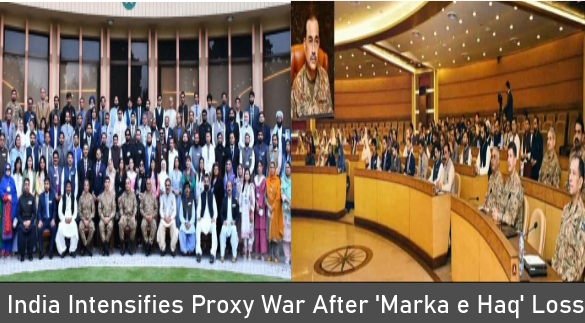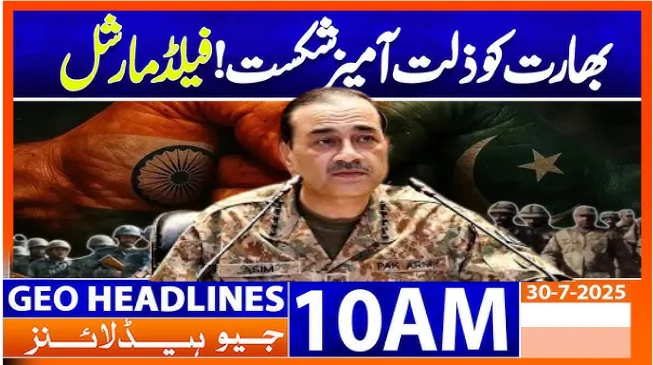India intensifies proxy war after ‘Marka e Haq’ loss, says Gen Munir, vowing to counter terrorism, defend Balochistan, and uphold national security.
Field Marshal Asim Munir has stated that India intensified its proxy warfare against Pakistan after suffering a defeat in the 19-day conflict known as “Marka-e-Haq,” which took place between April 22 and May 10. According to the Inter-Services Public Relations (ISPR), the Chief of Army Staff (COAS) made this assertion while addressing participants of the 16th National Workshop in Balochistan. The military’s media wing highlighted that the Indian effort was aimed at undermining the deep-rooted patriotism of the Baloch people through organized terrorist proxies operating under the umbrella of hybrid warfare. Gen Munir declared that these proxies would meet the same humiliating defeat as experienced during Marka-e-Haq.
India Intensifies Proxy War After ‘Marka e Haq’ Loss, Pakistan Slams Terror Tactics
COAS Munir condemned India’s persistent sponsorship of terrorist elements, categorizing it as a clear and failed attempt to destabilize the region. He asserted that Indian-supported groups were part of broader hybrid threats labeled as Fitna-al-Khawarij and Fitna-al-Hindustan. These operations were seen as extensions of India’s hostile strategy to exploit internal vulnerabilities and inflame unrest within Pakistan, especially in Balochistan. Gen Munir stated that the Pakistan Army remains committed to defending the country’s sovereignty and dignity by taking decisive action against these threats.
COAS Emphasizes National Unity Against Terrorism
Addressing a diverse audience including members of parliament, civil society representatives, civil servants, media professionals, and youth, the army chief emphasized that terrorism knows no boundaries of religion, sect, or ethnicity. Therefore, a cohesive and collective national response is necessary to confront and eliminate this menace. The COAS underscored the importance of unity among all stakeholders to ensure a strong and resilient national front against any internal or external threats.
Pakistan Army Reaffirms Commitment to Uproot Terrorism
Field Marshal Munir reiterated the Pakistan Army’s unwavering commitment to uprooting terrorism in all its forms. He emphasized that national security is inseparable from socio-economic development, particularly in provinces like Balochistan which have historically been targeted by adversaries. The COAS confirmed that comprehensive counterterrorism strategies will continue in tandem with developmental initiatives to secure lasting peace and stability in the region. He assured the nation that the military is fully prepared to respond to any challenge to national security.
Socio-Economic Development Integral to National Cohesion
Highlighting the strategic importance of Balochistan, Gen Munir noted that development in the province is critical to ensuring long-term peace and national cohesion. He advocated for integrated efforts across federal and provincial agencies to implement infrastructure, education, and healthcare projects that uplift local communities. According to the COAS, a cohesive national development strategy supported by secure environments will enable Balochistan to thrive economically while neutralizing the appeal of anti-state propaganda.

Support for Development Efforts Across Civil and Military Institutions
The army chief stressed the need for collaborative action between civil and military institutions to advance the development agenda in Balochistan. He mentioned that inter-agency coordination would be crucial to tackling the root causes of militancy and promoting inclusive growth. Gen Munir called for proactive roles from policymakers, development authorities, and law enforcement agencies to ensure that all progress initiatives are safeguarded and delivered effectively.
Army Prepared to Safeguard National Sovereignty
Gen Munir reinforced the Pakistan Army’s role as the protector of national sovereignty and dignity. He emphasized that any attempts to destabilize Pakistan through proxy wars or psychological operations would be met with a firm response. The military leadership reaffirmed its commitment to preserving internal peace while also maintaining high vigilance against external threats. The COAS stated that the Pakistani nation stands united with its armed forces against hostile intelligence operations and destabilization attempts.
Corps Commanders Conference Vows Decisive Action
The COAS’s statements come on the heels of the 271st Corps Commanders’ Conference (CCC), during which the military’s top leadership resolved to take decisive actions against India-backed and India-sponsored proxies. The CCC, chaired by Field Marshal Munir, took note of the increasing aggression by Indian intelligence services and reaffirmed a strategic resolve to eliminate these threats. The forum discussed national security in detail and evaluated both conventional and non-conventional threats to the country.
Indian Army’s Narrative Rejected by Pakistani Leadership
The Corps Commanders’ Conference also rejected what it described as “baseless insinuations” from the Indian Army attempting to distract from its own strategic and tactical setbacks. The conference concluded that India was resorting to propaganda and disinformation to veil its failure in Marka-e-Haq and ongoing challenges in occupied territories. The Pakistani military leadership maintained that such narratives are part of broader psychological warfare aimed at confusing public opinion and destabilizing regional peace.
DG ISPR Confirms Indian Involvement in Cross Border Plots
In a recent interview with Al Jazeera, Director General of the ISPR, Lieutenant General Ahmed Sharif Chaudhry, also discussed India’s increasing reliance on covert operations and proxies. He confirmed that India has been operating transnational terror networks with the intent to carry out targeted assassinations and create unrest inside Pakistan. According to Lt Gen Chaudhry, there is credible evidence indicating the direct involvement of Indian intelligence agencies in sponsoring criminal enterprises and terrorist groups functioning within Pakistan.
Pakistan’s Evidence-Based Claims Presented Internationally
Lt Gen Chaudhry further explained that Pakistan has consistently presented evidence to international forums detailing the involvement of India in cross-border attacks and transnational killings. He stated that these activities violate international norms and pose a threat not just to Pakistan but to regional stability. The DG ISPR reaffirmed that Pakistan would continue to expose such activities and seek international accountability for violations of sovereignty and human rights.
National Resolve Required to Combat Hybrid Warfare
COAS Munir concluded his remarks by highlighting the need for greater national resolve to confront hybrid warfare tactics employed by hostile states. He called for increased public awareness, stronger cybersecurity protocols, and legislative reforms to safeguard the integrity of national institutions. The military leadership emphasized the importance of counter-narratives that reinforce national identity and unity in the face of external disinformation campaigns.
Way Forward for Peace and Stability in Balochistan
Field Marshal Munir reiterated that Balochistan’s future lies in peace, development, and integration. He called on local communities to reject extremist ideologies and support state-led efforts for upliftment. The army chief confirmed that the Pakistan Army will continue to work with all segments of society to eliminate terrorism and ensure the province achieves its full socio-economic potential. The COAS emphasized that only through unity, development, and law enforcement can long-term peace and prosperity be achieved.
Government and Security Institutions United Against External Threats
The article concludes with the clear message that Pakistan’s military and civilian leadership are aligned in their stance against foreign-backed proxy warfare. Measures are being taken at all levels of government to fortify national security and neutralize destabilizing actors. Strategic vigilance, intelligence sharing, and public cooperation remain essential tools in protecting the country’s integrity and sovereignty against evolving threats posed by India’s hybrid warfare tactics.
Conclusion;India Intensifies Proxy War After ‘Marka e Haq’ Loss
Field Marshal Asim Munir’s remarks underscore Pakistan’s growing concern over India’s alleged use of proxy networks to destabilize national unity, particularly in Balochistan. Emphasizing a collective national approach, the COAS reiterated the armed forces’ commitment to eliminating terrorism and promoting socio-economic development. As regional dynamics evolve, Pakistan’s leadership remains focused on safeguarding national security, countering hybrid threats, and fostering internal cohesion for long-term stability.

